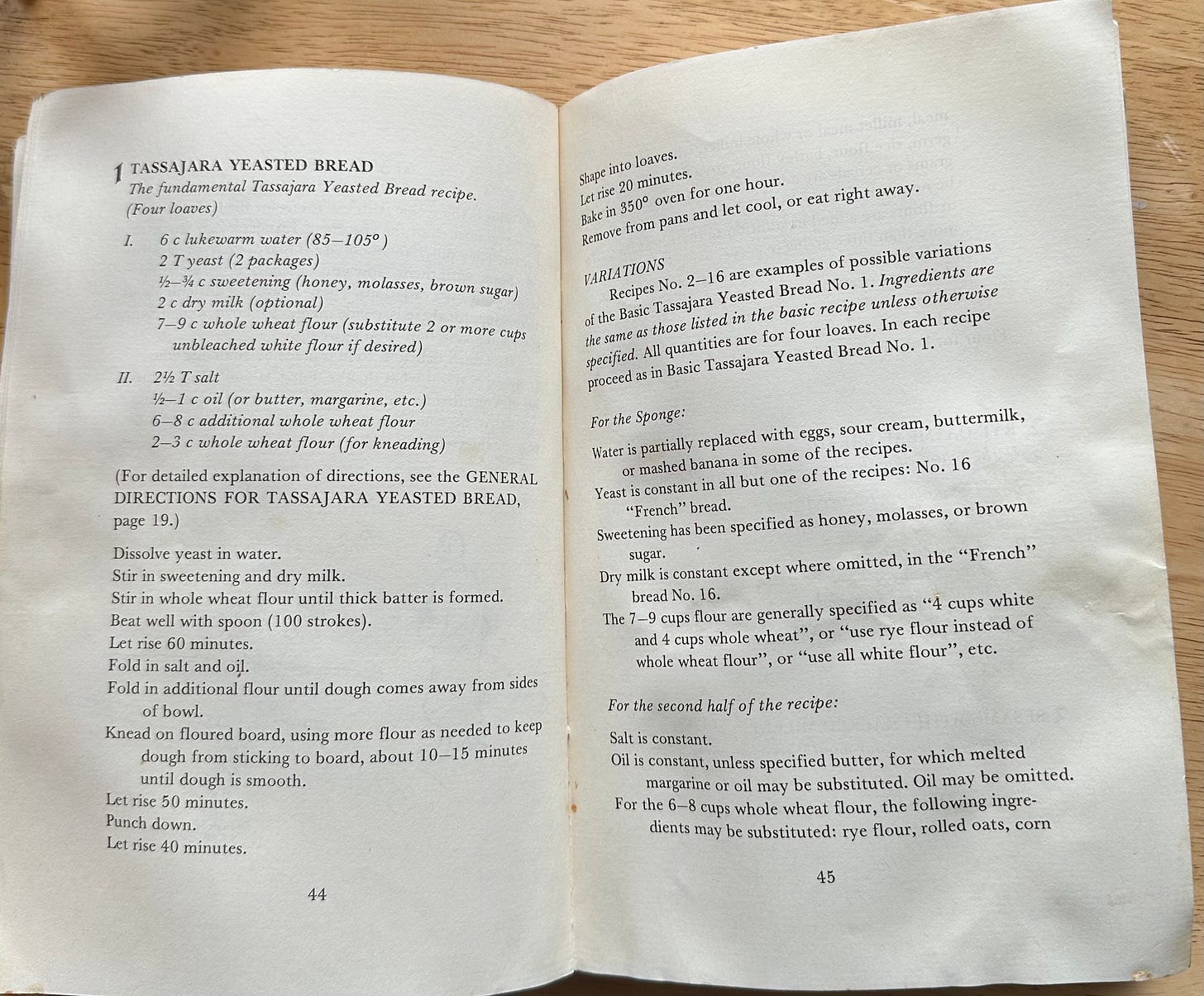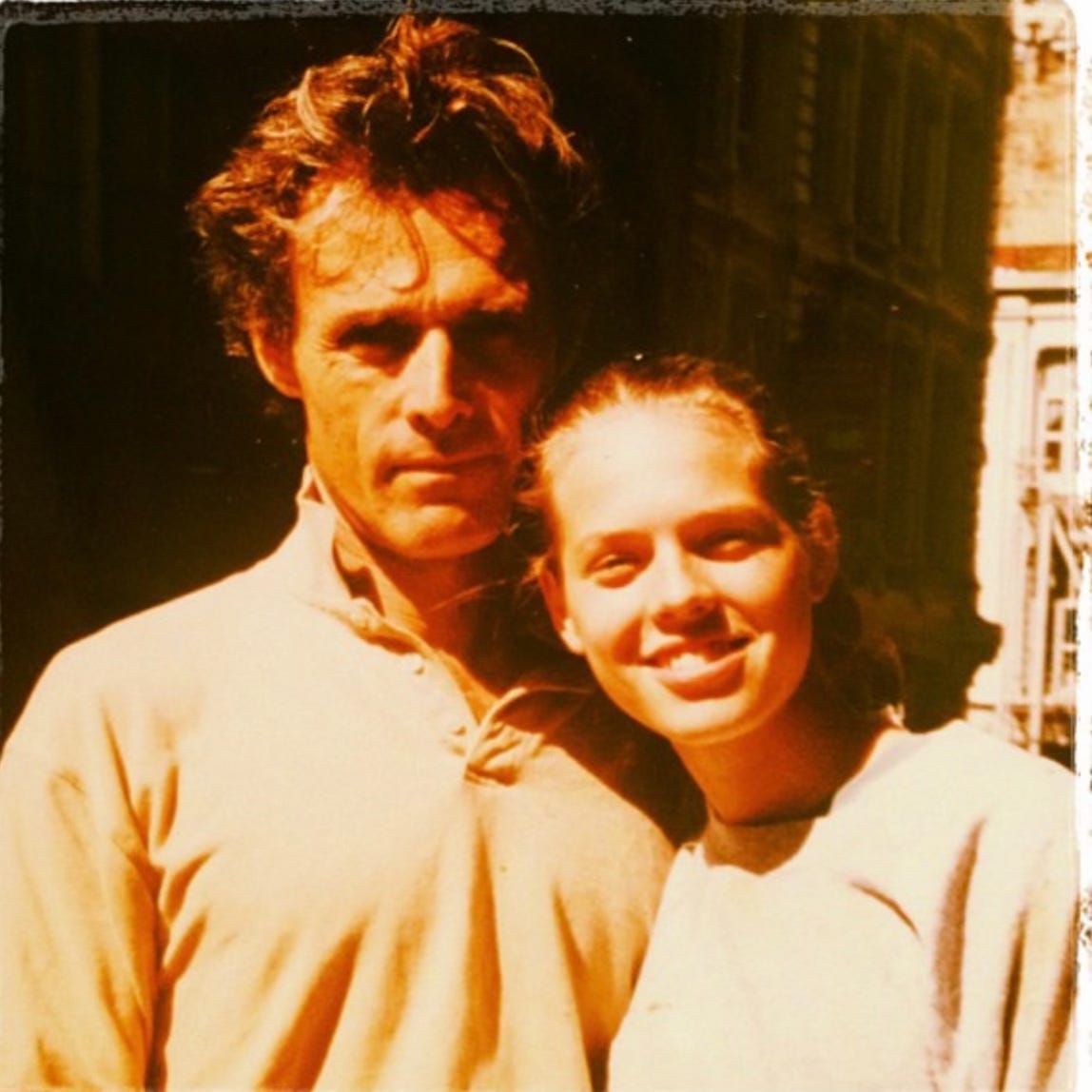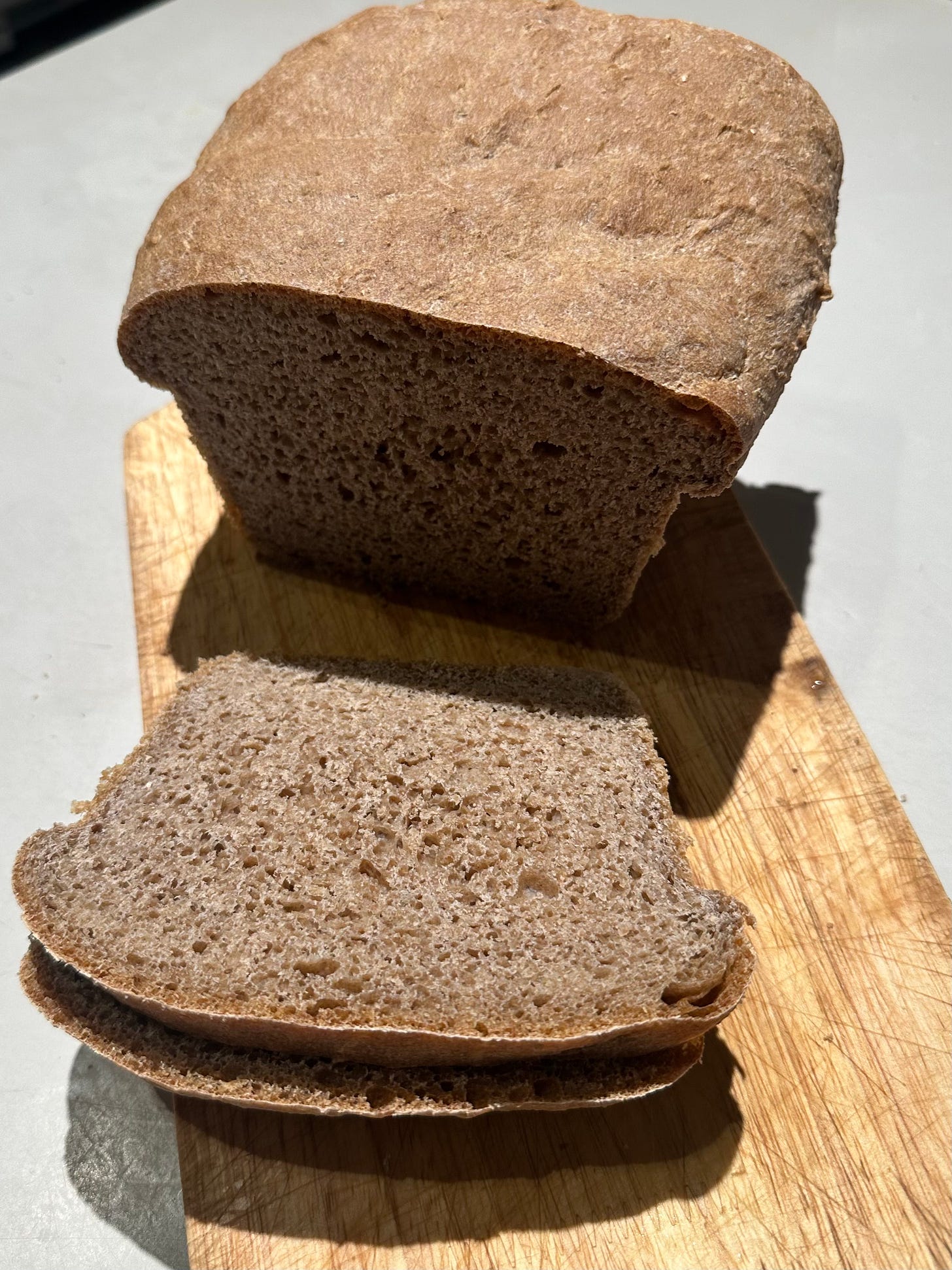Flour in the Air
A story about my Father and Bread.
My father’s bread has been my sustenance for as long as I can remember. It’s what I eat for breakfast every day, unless he makes blueberry pancakes. Even when I lived in LA, I ate my father’s bread—he’d mail me multiple loaves at a time across the country. When I was a teen figure skating in Colorado Springs and Canada, he sent me bread then too. Considering I was training for hours a day and practically starving myself, a daily slice was essential. I’ve never been without my father’s bread.
He started baking when I was little, during my asthma years. I was just two when I first said, “cough cough,” because I didn’t yet have words to say, “Help me, I can’t breathe.” For the next couple years, I was in and out of hospitals, pumped full of drugs that made me hyper and strung out—then I’d crash. Then another attack. Eventually, my overwhelmed, terrified parents took me to a naturopath, chiropractor, and kinesiologist, Dr. Gregowski. He had them cut wheat and dairy from my diet and give me vitamins, which they tried to hide in spoonfuls of applesauce.
My father turned to the Tassajara Bread Book to bake rice bread—which I could tolerate—but according to my parents, it tasted like dense pudding. By the time I was four, I had miraculously outgrown asthma, so my father switched to baking whole wheat bread, and that tasted really good.
When he makes bread, he takes over the whole kitchen. There’s flour all over the floor, counter tops, and in the air like thick dust. He mixes the dough in a big metal bowl, then covers it with a similar overturned bowl, and leaves it to rise. He returns twice to beat it down, throwing his whole body weight into it, his dough-covered fists punching and pounding. (He’s tried to teach me to bake bread a few times, but it is very physical, and I don’t always want to beat down the dough, especially when my lower back was inflamed.)
Then he presses a stick of butter down so it mushrooms out all over the inside of multiple black rectangular tin pans, fills the pans with dough, and shoves them into the preheated oven. The loft erupts with a warm bread fragrance, the kind that stops you in the street and makes you sniff around to find its source. Forty-five minutes later, the bread is born. At this point, he proudly offers my mother and me buttered slices. Even if I’m full, I’ll usually have a bite and say, “Mmm,” because it’s damn good—and well, it makes him happy.
My father’s bread can be a burden.
I remember one summer—I was six or seven—we stayed for a few months in a community around a small lake in upstate New York. I made some friends there. One evening, my girlfriend’s parents were driving us to a nearby roller rink. My father had packed me a salami sandwich, but my friend’s parents had just picked up a pizza pie. Her mother asked if I wanted a slice, and even though my mouth was watering, and I desperately wanted a slice, I told her I couldn’t eat it because my father had already packed me a sandwich for dinner.
She said that just because he packed me a sandwich didn’t mean I had to eat it, and that if I wanted pizza, I should have it. But I knew if I ate the pizza, I wouldn’t have an appetite for my father’s sandwich, and then I wouldn’t know what to do with the sandwich. I couldn’t give it back to him. I asked her what I should do with my dad’s sandwich, (I even offered it to her) and she told me I should throw it out.
Throw it out!
I felt an almost dizzyingly sharp sense of panic. Throwing it in the garbage felt like a betrayal— it made me want to cry. This feeling was so intolerable, I stuffed my face with a sandwich I didn’t want. The mother looked at me like she was worried.
My father is very protective of his bread. My mother and I rarely cut it ourselves because we don’t know how to cut it like he does. He knows exactly what to do with the bread knife so that the slice is never uneven or so it never falls apart. He’ll often cut several pieces for us in the morning so we have bread readily available while he’s at his studio sculpting. He keeps his bread tied in a clear plastic bag, with the cut end pressed together to keep the air out.
If he has forgotten to slice bread (which has happened) and I want a peanut butter and strawberry jam sandwich, I do sometimes find it nerve-wracking to cut it on my own because I don’t want to get in trouble for wrecking it. (There have been occasions when he’s been frustrated by how I’ve hacked into it.) But if I do have to cut my own slice of bread, I usually cut it medium speed and always on a breadboard for sturdiness. If I cut a loaf too slowly and cautiously, it can lead to crumbling, and if I cut too quickly and recklessly, it can be wildly uneven and form dents.
So with medium speed and utmost care, I’ll sink the corrugated blade into the outer crust until I get to the soft inner part—then I take a deep breath—and I’ll turn the bread slightly to its side, slice a little more, and then turn the loaf around as much as needed to finish the job. I’ve accepted that my slices will never be as perfect as my father’s slices.
Lately, my father has been a bit more low-key about other people (my mother and me) cutting his bread. Even so, when he’s home and at his desk—which is in my parents’ bedroom across the loft—I might decide to cut the bread by myself so as not to disrupt him and to show myself, despite his nearby presence, I can cut his bread on my own. And even though he is hard of hearing these days—from all that drilling and hammering metal with pneumatic tools—when it comes to his bread, his ears prick up at slightest ruffling of plastic.
He’ll push back his screeching chair, shoot up, and walk quickly towards me, saying, assertively but sweetly, “I’ll cut you a slice of bread.”
And I’ll say, “Okay, but I can do it myself.”
And then he’ll say, “I know you can, but I’m here, so I might as well.”
And I will feel both infantilized and cared for, and I will feel a tingle in my throat and the ache of love and then a sickening fear—no, a certainty—that he won’t always be here to give me bread. I’ll watch him cut a beautiful slice and then hand it to me.
“Thanks, Dad,” I’ll say, all chill, like it’s only a slice of bread when I know he’s just handed me his whole heart.
— 💗 —
Find me on Instagram: https://instagram.com/jasminelobe
P.S. I’m keeping All That Jas free for now because I want these stories to be shared. But if you’d like to support my work—and help me keep creating—becoming a paid subscriber means the world.





A sweet story! Masterfully written!